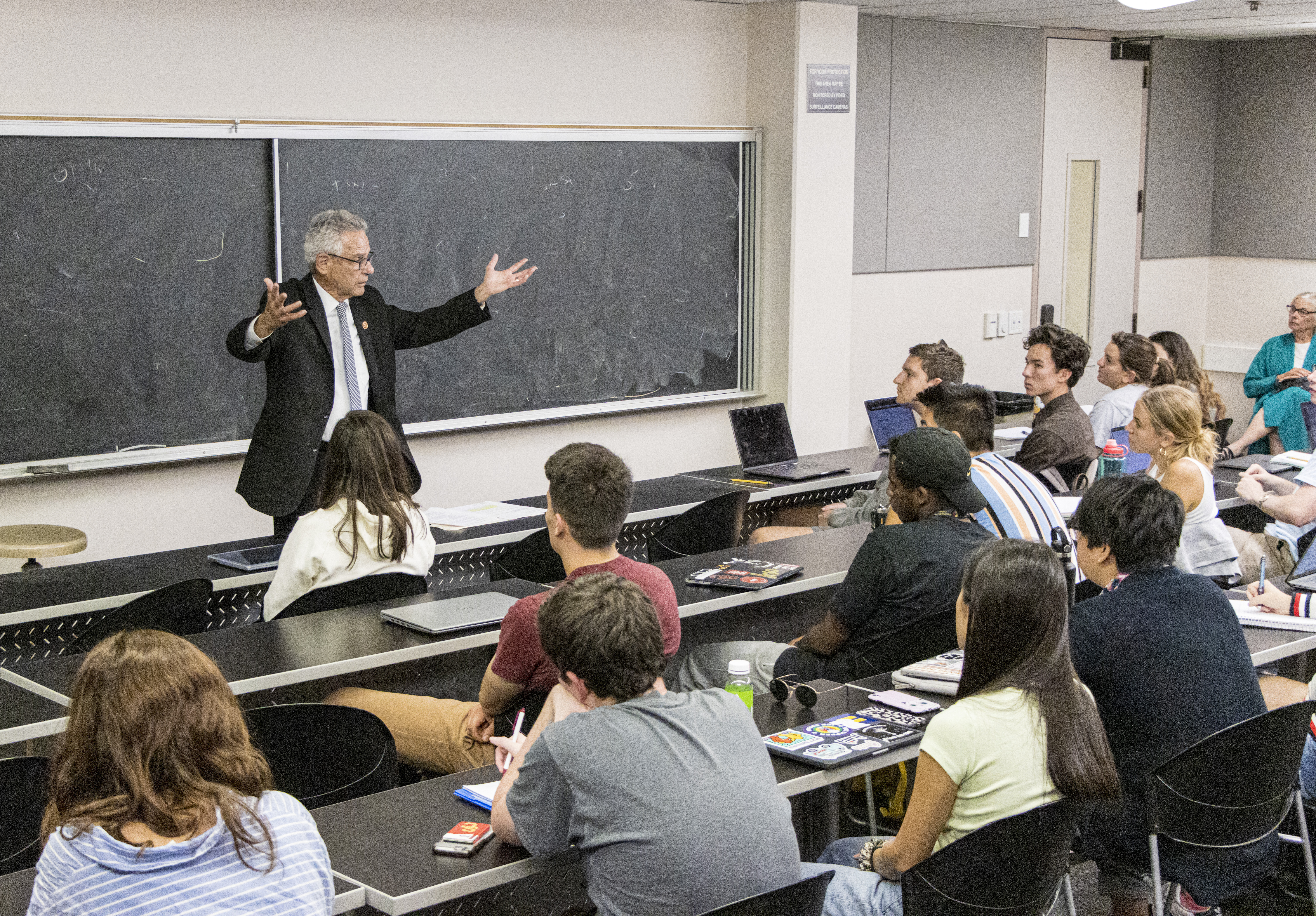This October, the USC Schwarzenegger Institute has been a bipartisan host to several of the nation’s leading experts on election and political reforms. Thanks to a new class launched this fall and sponsored by the USC Schwarzenegger Institute, USC students are learning how to take action to fix American democracy and reform our political system. Congressman Alan Lowenthal, Kelly Ward Burton of the National Democratic Redistricting Committee, and Evan McMullin of Stand Up Republic have all visited the Schwarzenegger Institute class to teach students how they can take action to reform American democracy. Earlier this semester, the class was opened by Governor and Professor Arnold Schwarzenegger, who gave an overview of redistricting reforms in California and across the states.
Taught by USC Schwarzenegger Institute Academic Director and Professor Christian Grose, the political reform class combines evidence-based research and information on how students can make a difference reforming politics and policy. The students have read about and heard from experts on gerrymandering, primary reforms, election security, and voting rights. Just this month, Professor Grose has guided the students to produce 60 new policy proposals to reform democracy as part of the class. Grose has written a book on redistricting, and continues to produce research that informs political reform efforts.
One of the highlights of the course has been the opportunity for USC students to engage with the nation’s leading experts on political reform. And this October they have heard from some of the top reformers – both Republicans and Democrats – as they search for bipartisan solutions.
Just last week, Evan McMullin spoke to class. McMullin is Executive Director of Stand Up Republic, a group fighting for political reforms and greater security against election interference. He is a Republican who launched an independent campaign for president in 2016, and who received more than 700,000 votes. Before this, he was chief policy director for the U.S. House Republican Conference.
McMullin held the students transfixed as he discussed ways that they can make a difference by enacting political reforms like efforts to reduce gerrymandering. He also discussed alternative voting systems, and spent much of his time discussing how we can improve election security in the leadup to the 2020 election. Students asked engaged questions, and McMullin stayed well after the allotted time to answer each and every question. The students ended class committed to combating electoral disinformation and working for policy solutions to make our elections more secure.
The previous week, Kelly Ward Burton spoke to the course. Burton is President of the National Democratic Redistricting Committee. She is a Democrat who is working to increase the number of independent redistricting commissions around the country, and has partnered with Governor Schwarzenegger and former Attorney General Eric Holder to engage in targeted redistricting reforms in some U.S. states.
Burton was dynamic and engaged the USC students in class. She talked about the importance of gerrymandering reforms to fight against minority rule in U.S. state legislatures, and she highlighted the recent USC Schwarzenegger Institute research report showing that 59 million Americans live in states where the party that won most legislative seats received a minority of the statewide vote. She discussed former President Obama’s Redistricting U. organizing efforts, and also encouraged the students to take part in engaging in their own efforts toward reforms in states where minority rule outcomes have occurred. Students discussed their original policy proposals to reform gerrymandering in states like Texas with Burton. Burton’s presentation to the students was gripping, as it talked about threats to fairness in democracy. However, the students left optimistic about what they could do in the future.
And in the first week of October, Representative Alan Lowenthal came to the class to talk about his federal resolution to reduce gerrymandering in congressional elections. Lowenthal, a Democrat, has sponsored this legislation with Representative Brian Fitzpatrick, a Republican. Lowenthal also discussed how he became interested in promoting redistricting commissions in California and beyond, and other political reform efforts currently under consideration in Congress. Before he served in Congress, Lowenthal was a member of the California Assembly, where he worked alongside Governor Schwarzenegger to enact the California Citizens Redistricting Commission; and where he served with Schwarzenegger Institute Senior Environmental Fellow Senator Fran Pavley, who also attended the class with Lowenthal. Lowenthal’s presentation was spectacular, and students queried him on everything from what it is like to serve in Congress to how the impeachment inquiry was proceeding in the House.
In October alone, the class has caused the students to learn how to take action to engage in public policies that will reform politics and elections. The class has spent weeks learning about gerrymandering, nonpartisan elections, electoral and institutional solutions for reducing partisanship, and ways of securing our elections, protecting voting rights, and enhancing and protecting American democracy. While here for the class, many of the speakers have also had the opportunity to engage with the Schwarzenegger Institute team, USC Price faculty, and USC students involved in the Schwarzenegger Institute’s Fair Maps and Political Reform Lab.
In addition to Governor Schwarzenegger and Professor Grose, other speakers who have already spoken to the course this semester include Kathay Feng, National Redistricting Director of Common Cause; Dan Vicuna of Common Cause; and John Opdycke of Open Primaries. Upcoming speakers include Kevin Shenkman, California election lawyer; Thurgood Marshall, Jr., Republican strategist Sean Walsh; Daniel Ketchell, Governor Schwarzenegger’s Chief of Staff; Betsy Sinclair, Principal, Magnify and Professor, Washington University; and Sara Sadhwani, USC Schwarzenegger Institute Fellow and Professor, California Lutheran University.
Thanks to the leadership of Governor Schwarzenegger and USC Schwarzenegger Institute Academic Director Christian Grose, USC students have had a front row seat to leaders pushing to reform our American democracy and fix misrepresentation.

